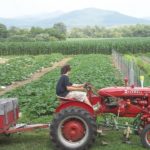Locally Grown Beans in the College Cafeteria
Vermont’s Farm to Plate Network offers farmer and producer examples of navigating the regional supply food chain to serve ‘local’ at institutions.

Vermont Bean Crafters burger display at Black River Produce food show. Photo by Rachel Carter.
School, hospitals, colleges, government agencies, and corporations are demanding food grown and produced in New England. Farmers interested in selling to hospitals, schools, and other organizations are following the food supply chain by connecting first with local or nearby food hubs to better assess supply and demand. Food hubs and processing centers have easier access to distribution channels and can help farmers and food producers identify and build market opportunities.Vermont Bean Crafters makes bean burgers and dips out of organically-grown Vermont beans, veggies, and grains. Dried bean varieties are purchased directly from organic farmers in New England and produced at the Mad River Food Hub in Waitsfield, Vermont. “The University of Vermont just swapped our black bean burger in place of Gardenburger and Devine burgers at all eight campus dining locations,” says Joe Bossen of Vermont Bean Crafters. “We’re also working with Fletcher Allen Healthcare to have our bean burgers more widely distributed throughout hospital food services.”

Fletcher Allen Hospital partners with over 70 local food producers. Photo by Fletcher Allen Healthcare.
Connect with Article Sources!
- Farm to Institution New England
- Food Solutions New England
- Vermont Food System Atlas
- Vermont Bean Crafters
- Black River Produce
- Kingdom Creamery of Vermont
- Harlow Farm
- Radical Roots Farm
Bossen finds value-added food products as financially viable given the constraints of budgetary challenges and publically traded ‘commodity’ markets. “On the whole, I’ve been impressed with chefs and purchasing agents willing to sit across the table from us small producers and their general willingness to make the local/regional food transition happen.” Vermont Bean Crafters products are also distributed through Black River Produce.
Supplying locally grown food within 150 miles from their home base in Springfield, Vermont, Black River Produce distributes to more than 2000 wholesale customers across Vermont, New Hampshire and parts of New York and Massachusetts. “We distribute local farm products to stores, schools, restaurants, clubs, camps, ski areas, hospitals, nursing homes, and farm stands. Larger contract management companies like Sodexo, the Vermont State Colleges food service provider, often require pre-approved vendor contracts that can be a major hurdle for small producers and farmers. By selling through a wholesale distributor, producers avoid the more stringent process of becoming an approved vendor, which can really facilitate the ability to sell to institutions,” says Scott Sparks, vice president of sales at Black River Produce.

Gabriel Michaud and his calf Butterfly enjoying a Kingdom Creamery ice cream cone. Photo by Kingdom Creamery.
Kingdom Creamery of Vermont is a family owned dairy farm and business, specializing in yogurt and ice cream,experiencing recent growth in institutional markets—offering both a reliable cash flow source and brand identity. “The institutional marketplace provides a more stable and consistent customer base than traditional retail markets. We have achieved moderate success within institutional markets. By working with local schools and institutions we have been able to broaden our product portfolio, and build relationships within the state and tie it directly to our family farm,” shares Jeremy Michaud of Kingdom Creamery.
Small Vermont farmers committed to farm to school relationships are working with local food hubs to sell directly to local school and increase the number of young people in the farm community eating lunches made with healthy, fresh, local food. Vermont’s Harlow Farm sells produce as the brand Westminster Organics for multiple Whole Foods accounts, yet wanted to see their produce served at local schools. “We started working with the Windham Farm and Food Network to distribute to area schools across the county. While it is a slightly lower price point than what we can get from Whole Foods, we are able to make it work for our business, and love the rewards of knowing we are providing local produce to children through school lunches,” comments Paul Harlow of Westminster Organics/Harlow Farm.Whether farmers choose to work with local processing units, regional distributors, or directly with schools in their community, building successful relationships is essential.

Radical Roots Farm of Rutland, Vermont is finding success farm to institution efforts on a local scale. Photo by Radical Roots Farm.
Radical Roots Farm in Rutland, Vermont, grows vegetables for a 70-member CSA, two farmer’s markets, and the local school system. “Developing an open, honest, and mutually beneficial relationship with the school food service professionals is essential. We are lucky—the people who provide food for the schools in our area care deeply about the children in their community. We sit down together in the winter and plan out how our farm can grow some of the vegetables they will need during the school year. Honesty and dependability are key. As farmers, we need to be sure we don’t over-promise and that we can actually deliver what we agreed to in the winter,” offers Carol Tashie of Radical Roots Farm.
Farmers interested in exploring farm to institution are also encouraged to look at industry trends. “Beans!” exclaims Joe Bossen of Vermont Bean Crafters. “And general staple food ingredients like corn meal and local grains—not to replace the bread basket, but to meet nutritional guidelines while incorporating locally grown and produced items.”
Both Bossen and Black River Produce stress extended season greens and lightly processed vegetables, such as lacto-fermentation, core to strengthening market opportunities. “Extending seasonal accessibility to provide the volume needed to match price points in budgets are more than a trend—this is becoming the reality and it’s much easier now than ever to have that discussion,” comments Sean Buchanan, business development manager at Black River Produce.
Rooted in the farm to school movement, Farm to Institution New England (FINE) is the leading Northeast resource connecting organizations, agencies, businesses, and funders with the regional food supply chain to strengthen food production and consumption.
Peter Allison, coordinator for FINE, says there are many opportunities for food producers and processors to market to the institutional food service system. “In Massachusetts, the Western Mass Food Processing Center shared use facility works closely with farmers to develop lightly processed foods that also meet the farmer’s bottom-line. FINE is also beginning research that will further help elucidate the benefits farmers gain by working with institutions, such as the ability to scale up production through new contracts with larger institutional clients.”
The Vermont Farm to Plate Network, legislatively directed to double local food access and production by 2020, is helping farmers develop relationships with distributors through matchmaking events and peer to peer collaborations. The newly launched Vermont Food System Atlas provides a searchable mapping tool to help farmers build relationships with distributors, processing centers, other farmers, and all entities representing the state’s food system. Food Solutions New England provides details on how all New England states are rebuilding local food systems and connects the work each state is conducting regionally.
The Vermont Farm to Plate Network is weaving together all components of Vermont’s food system to strengthen the working landscape, build the resilience of farms, improve environmental quality, and increase local food access for all Vermonters. Explore the Vermont Food System Atlas.

